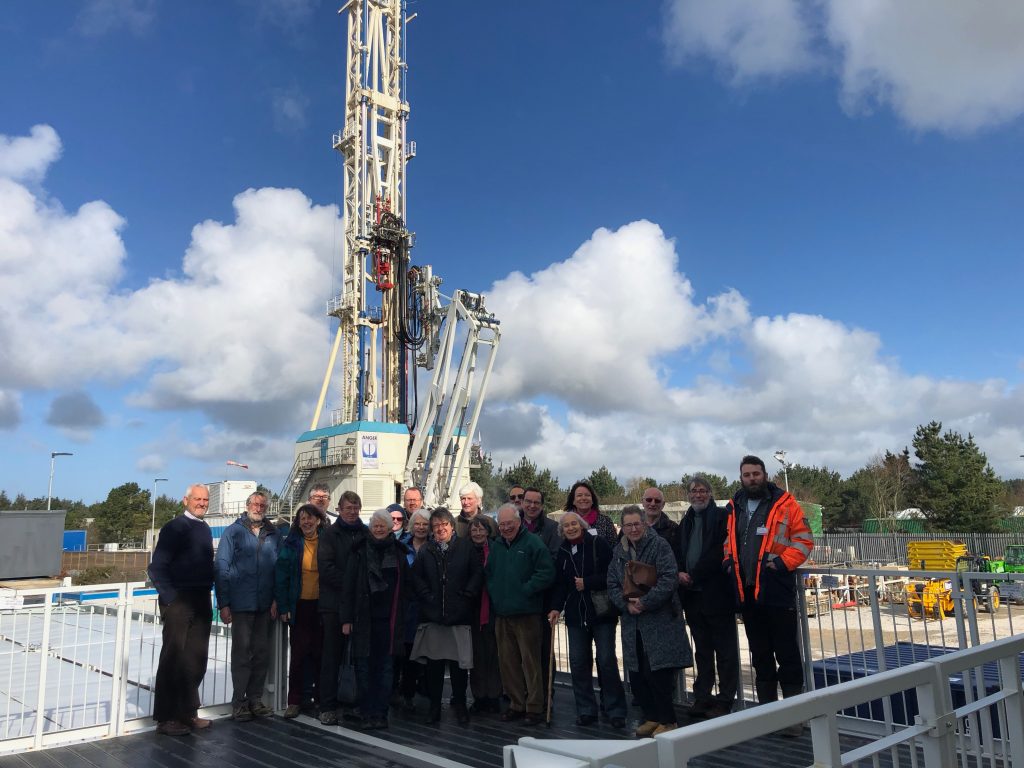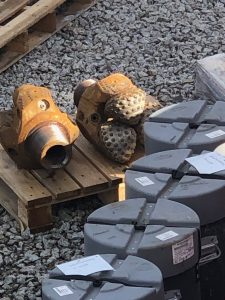Safeguarding creation is everybody’s duty: Bishop Philip
Cornwall’s aspirations to be in the vanguard of renewable energy in the UK got the thumbs-up from Bishop Philip, this week as he visited the United Downs Deep Geothermal Power (UDDGP) project, where drilling of the first of two deep holes started in November.
This week they reached a depth of 3km and the project now has the deepest hole ever drilled in Cornwall.
The ultimate plan is to drill down to 4.5km and harness the temperature of the earth there to heat water and to drive turbines – thereby generating electricity.
Funding from Cornwall and Europe
It might sound simple, but getting to this stage has already taken 10 years of geological surveying and research, of putting together a business case and accessing funding – not least from the European Regional Development Fund and Cornwall Council.
It is hoped this project will prove the viability of the techniques so private investors will be willing to fund future geothermal power plants in the county.
Bishop Philip was one of a group of 20 people who visited from the diocese. The other members of the group have all been working with environment officer, Luci Isaacson.
They visited the site at United Downs and heard from UDDGP’s community relations manager Jane Charman, as well as project geologist Lucy Cotton, graphic designer and education co-ordinator Suzie Doe and drilling support engineer Jan Laszcak-Moodie.
The project relies on Cornwall’s geography and the fact that the whole peninsula sits on a giant outcrop of granite, which generates heat.
It is hoped that once the drilling is over, there will be a low-impact, small power station on the site that will generate electricity for at least 25 years.
UDDGP is keenly aware of its place in the local community. For example, the sound levels of the drilling rig are closely monitored so that action can be taken if they approach pre-agreed limits.
Community focus
The company is also keen that much of its spending is within the local community, and to encourage its employees and contractors to do likewise. UDDGP has a community fund that has so far given money towards a children’s play area and outdoor gym at Gwennap, and a defibrillator for Carharrack. Its second round of grants are due to be decided at the end of this month.
There is also an active outreach programme so that the project’s scientists work with local schools, community groups are encouraged to organise visits, and the project also has drop-in sessions for all-comers at various open days throughout the year.
Bishop Philip said: “I was terribly impressed by the project, which is an exciting, contemporary and sustainable take on Cornwall’s expertise in hard-rock mining. Being able to generate electricity by harnessing the earth’s natural resources and in a way that causes far less damage to the environment is clearly a good thing.
‘We should each reflect’
“We are all charged with striving to safeguard the integrity of creation, and sustain and renew the life of the earth in accordance with the Five Marks of Mission, and we should each reflect upon how we can do this in our lives.
“For many of us it will be about making small changes to our day-to-day lives, by looking at what and how much we consume, at when and how we shop, the power we use in our vehicles and our homes, and hopefully also looking beyond that at our working lives, and church and wider communities.
“However, on a wider level it is vitally important that well-researched projects such as this are given funding in order to ensure that we can move away from our profligate use of fossil fuels – not least because we now have a greater understanding of their impact on our health and the health of our planet.
‘Inspired’
“I was also impressed by the way in which this project seems to have considered its local environment. From what we heard, they have done a great deal to be in touch with the communities surrounding them, and to talk through people’s hopes and fears.
“I can highly recommend a visit to United Downs and the project, whether you are a church group, a school, or any other kind of community group. You cannot fail to come away inspired by the work they are doing – and optimistic that there is much we can do to help safeguard the wonderful environment from which we all benefit so deeply.”







